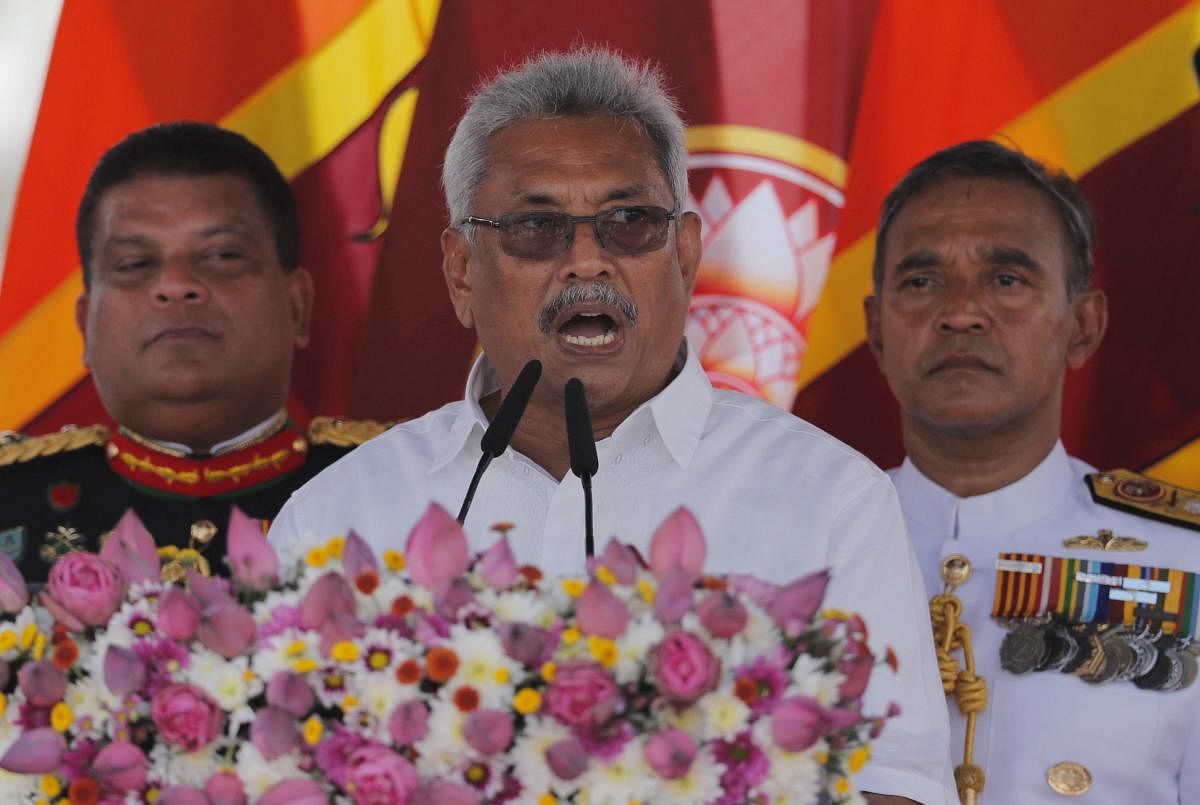
The election of Gotabaya Rajapaksa as the seventh Executive President of Sri Lanka has proved the democratic credentials of the island state to the international community. The fact that outgoing President Sirisena decided not to contest the elections ensured that the country had free and fair elections. Earlier, the February 2010 elections in Sri Lanka witnessed allegations of rigging against Gotabaya’s brother, former president Mahinda Rajapaksa, who was seen as having been elected through fraudulent votes. Similarly, Sri Lanka’s December 2001 elections were also plagued by rigging and poll violence, but the socio-political landscape was different, with the civil war underway across the country. Today, the electoral victory of Gotabaya’s Sri Lanka Podujanna Party solely represents the success of the Sinhalese and not necessarily of the minority Tamil, Muslim and Christian communities.
A former army Lieutenant Colonel, Gotabaya, 70, is adored by the Sinhalese majority and the powerful Buddhist clergy for how he and his brother Mahinda Rajapaksa won the civil war in 2009 against the Liberation Tigers of Tamil Eelam (LTTE). He was the defence secretary when the Sri Lankan military proved victorious over the LTTE. Now, Gotabaya has trumped his two political rivals Sujith Premadasa and Anura Kumara Dissanayaka. Premadasa had strong support in minority Tamil areas but a poor showing in Sri Lanka’s Sinhalese heartland, a core support base where Gotabaya won some two-thirds of the vote. The Sinhalese constitute 74.9% of the population and are concentrated in the densely populated south-west and central parts of the island.
Premadasa represented the interests of Tamils, who live mainly on the Jaffna peninsula. The Sri Lankan Tamils, concentrated in the north and east of the island, form the largest minority group at 11.1%, according to the 2012 population census. The Indian Tamils constitute a distinct ethnic group of 4.1%, are mostly plantation workers, and are concentrated in the "tea country" of south-central Sri Lanka. Besides, the island is home to about 1.97 million Muslims, or 5% of the population. Muslims of Sri Lanka include Sri Lankan Moors, Coastal Indian Moors, Malays, Memons and Bohras.
Most Sinhalese are Buddhists and most Tamils are Hindus; about 6% of Sri Lankans are Christians. Dissanayaka is a leader of the Janata Vimukhthi Peramuna, a Communist and Marxist-Leninist party in Sri Lanka. He is known to support the LGBTQ community and his political constituency appears to be smaller than those of his two political rivals.
Sri Lanka is a case of a majority religion, namely Sinhala Buddhism, being associated with a ‘national identity’ model like Israel, Ireland, India, Poland and Pakistan. One religion is numerically superior to the others and adherents of the numerically dominant religion tend to implement their beliefs in public policy. Each of these countries have their majoritarian religions which accommodate minority religions in terms of education and employment opportunities through reservations.
In 1956, Solomon Bandarnaike came to power on a wave of Sinhalese nationalism with his Sri Lanka Freedom Party (SLFP). The SLFP made Sinhala, rather than ethnic-neutral English, the national language through the Sinhala Only Act, and promoted policies that further disenfranchised the Tamil minority, including increased restrictions on Tamil access to citizenship. This power of Sinhalese nationalism supported Gotabaya’s electoral victory.
Ten years after Sri Lanka’s civil war ended in 2009, earlier this April, serial bomb blasts impacted the island nation’s security and economic environment. The country’s security and economy are intertwined given its tourism-driven economy. The blasts adversely affected tourist arrivals. The country is burdened with a $34.4bn foreign debt, which is proving a challenge for the political leadership to manage. Therefore, voters elected the winner on the perceived ability to address these two concerns of security and the economy. However, the political return of Gotabaya Rajapaksa to power in Colombo augurs ill for democracy, given the brothers’ 10-year track record from 2005 to 2015, a period that witnessed political violence and repression against minority Tamils and Muslims.
The presidential election also has strategic implications that transcend the island-nation with the potential to impact the larger region. In the sense that the island’s domestic dynamics has a bearing on its external dynamics of the South Asian region, given the pro-China tilt of the Rajapaksa regime. Unlike India, which is concerned about human rights and democracy in Sri Lanka, China ignores such issues. Now, China is expected to expand its footprint in the region through development of close social, political and economic relations with Sri Lanka. To that extent, Sri Lanka amounts to a ‘swing’ state in the South Asian region.
These presidential elections were invariably fought on promises to strengthen the economy, control corruption, restore rule of law, address the civil war legacy and draft a new constitution. These key issues are future challenges for democracy in the island country. The leadership should now equally represent the concerns of Sinhalese, Tamils, Christians and Muslims to promote democracy and security in Sri Lanka.
(The writer teaches International Relations and Strategic Studies at the Christ Deemed to be University, Bengaluru)